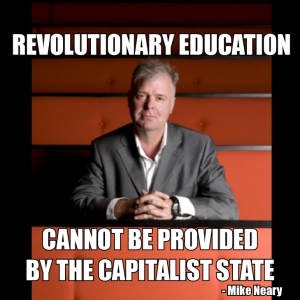Tagged: occupy
Occupying the City with the Social Science Centre – an Interview with Mike Neary
Summary: Professor Mike Neary speaks on the origins, purposes, and tensions of The Social Science Centre, Lincoln in the UK, an alternative form of higher education provision run as a formally constituted co-operative. The Social Science Centre sets itself against the usual colonial relations between universities and communities, seeking to occupy and re-invent the ‘idea of the university’ by producing critical, practical knowledge grounded in the real lives of its members. Neary raises questions about how such projects can create new, sustainable forms of social wealth against and beyond capitalism.
Could students in the US pull off a strike like in Montreal?
An Interview with Marianne Garneau
(co-author of “Snapshots of the Student Movement in Montreal”)
Summary:
Against a kind of activist-y, spectacular politics, Marianne Garneau argues that US students and workers can learn from the Quebec model how to organize our power as a class. Quebec students have kept their tuition low because they’ve historically had a vibrant, militant student movement, one that is willing to strike and directly disrupt, and not wait for the leadership of the business unions. The organizing model is to create directly democratic bodies—department-by-department assemblies—that know how to leverage our power to fuck up the business of the people who are screwing us over, whether they’re our educators or our employers.
Carving Compassion, Camouflaging Antagonism & Building Cooperative Alternatives – an Interview with Anna Feigenbaum
Summary:
Dr. Anna Feigenbaum gives her thoughts on radical teaching and organizing within and beyond the university. Against education that tries to transmit radical politics to students, she recommends an approach that starts with students’ experiences and works with them through the difficulties and challenges they face—and witness—in their everyday lives. Revolutionary pedagogy can be embedded in art and creativity, engaging students through playful, reflexive and collaborative projects. Rather than getting caught up in puritanical self-flagellation over what cannot be achieved, struggles can be seen from a more ecological perspective, one that works both inside and outside institutions simultaneously: chiseling the university’s walls while building cooperative alternatives.
YoSoy132: Student-led Uprising in Mexico – An interview with Patrick Cuninghame (Professor, Mexico City)
CW: What is the deal with YoSoy132?
Patrick: It’s kind of a weird movement, because it started in the private universities, in a very upper class Catholic private university called Iberoamericana. It’s probably one of the more progressive private universities, because it has a quite independent and active faculty trade union. It arose in response to Enrique Peña Nieto who is the PRI candidate for president. The PRI (Partido Revolucionario Institucional) was in power continuously from 1929 to 2000, one of the world’s longest running dictatorships, guilty of incredible abuses of human rights. The most infamous one was the massacre of Tlatelolco on October 2nd, 1968, just before the Olympics, when the Mexican army and paramilitaries killed around 500 people in a square near the center of Mexico City. It’s never been properly investigated. The ex-Mexican president, Luis Echevarria who was the minister of Internal Affairs when that happened, was briefly arrested and charged with genocide in 2006, but was almost immediately released. In spite of all their crimes, they’re on the point of being re-elected after just 12 years out of power. It’s like fascism coming back. The problem is that the party that’s been in power, the PAN (Partido Acción Nacional), has been as bad if not worse than the PRI. So, it’s just gone from the frying pan to the fire and back to the frying pan again. 60,000 have died in these last 6 years of President Calderon from the ‘war against drugs,’ which in reality has been a war against the whole population, at the same time a new form of governance and a new theatre in the “global war against terrorism”. It’s been government through military dictatorship that we’ve had in Mexico since 2006, and the electoral fraud in 2006, too, that started it. Of course there’s a real danger of another electoral fraud. Until May 11th it seemed like Enrique Peña Nieto was going to win the elections easily. There had already been one or two setbacks for him. First, at the Guadalajara International Book Fair in December last year, he was asked what were the three most important books in his life, and he couldn’t name one. He is just such a complete airhead, an ignoramus. This is the guy who’s going to be the next president of Mexico!



